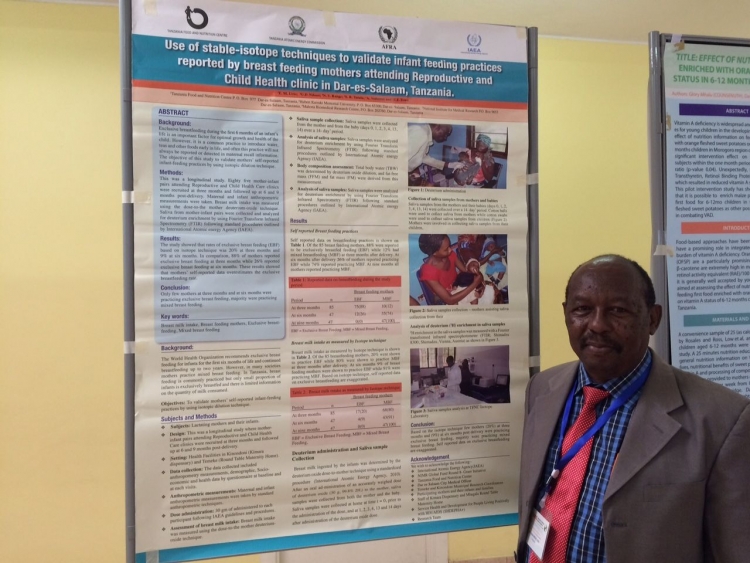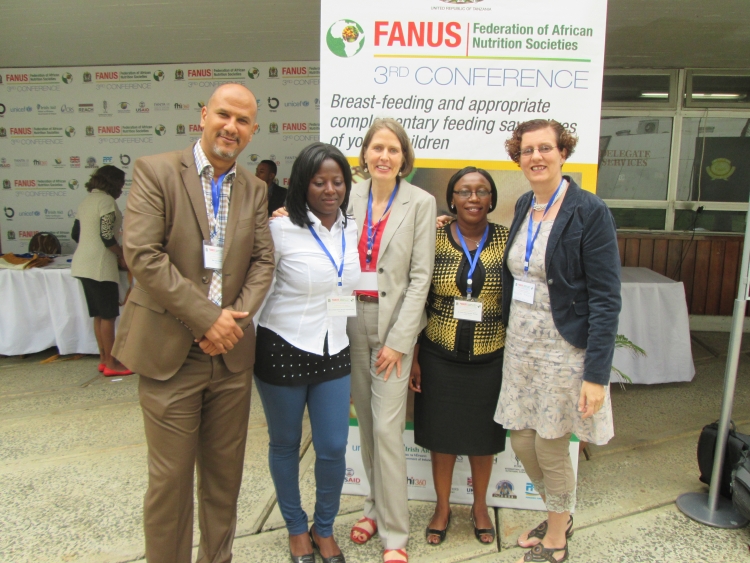Since their adoption and recognition in 2000, the eight chapters of the Millennium Declaration have defined the priorities of the United Nations in the field of international development, shaping global and national development policies and practices. With the deadline for the Millennium Development Goals (MDGs) in sight, and with the post-2015 Development Agenda taking shape ahead of us, nutrition experts and regional stakeholders gathered this week in Arusha, Tanzania, to discuss current and emerging nutrition-related challenges at the 3rd Federation of African Nutrition Societies (FANUS) Conference. Experts from the International Atomic Energy Agency were there to raise awareness of how stable isotopes and complementary techniques can be used to measure human milk intake, body composition and energy expenditure. This data is essential for the design and evaluation of nutritional interventions.
Held every four years, the African Nutrition Conference provides an opportunity for the professional nutrition community-which includes researchers, policy-makers, programme implementers and private sector stakeholders-to build networks, share research and collectively explore all aspects of the discipline. This year's Conference, held from 25-29 May, focuses on the achievements in the African region with regards to both sets of United Nations Development Goals: The MDGs, and their successor, the Sustainable Development Goals (SDGs).The Conference, which was attended by more than 300 participants, boasted a comprehensive agenda which highlighted a range of pressing food and nutritional matters, including: Changing patterns in the region; nutrition as a human right or as an investment case; nutrition governance and accountability; maternal nutrition; obesity and non-communicable diseases; and nutrition training and education.
During the opening ceremony, Ms Joyce Kinabo, President of the Federation of African Nutrition Societies (FANUS), underscored her hopes that the Conference would substantively address, and eventually tackle, all of the aforementioned areas: "The primary purpose of this gathering is to share our experiences, our triumph and fears, in food and nutrition research, planning and advocacy for the betterment of our communities. I hope by the end of the conference we will have fruitful deliberations on how we move forward from here in our efforts to scaling-up nutrition in our countries."
As part of its contribution to the Conference, the IAEA organized a two hour session on 'Breast-feeding and Complementary Feeding.' The session attracted more than 60 participants, who had the opportunity to speak and engage with the IAEA presenters in an interactive discussion session which extended almost an hour beyond the initial presentation.
In order to highlight the value of stable isotope techniques to government policy-makers and nutritionists, the sessions shared the first results of a completed technical cooperation project on infant feeding practices1 with attendees. Concluded in late 2014, this project sought to address the nutrition of infants and young children in the African region, which is home to 10% of the world's population, and yet bears 41% of the global under-five mortality burden. These figures, while shocking, have the potential to be dramatically reduced through breastfeeding. According to the Lancet (2013), 11.6% of all under-five deaths could be entirely prevented through optimal breastfeeding of infants under two years of age. This includes early breastfeeding initiation within one hour of birth, exclusive breastfeeding of infants till six months of age, and continued breastfeeding until two years of age or older. By building capacities and strengthening knowledge of stable isotope techniques in 20 African Member States, the project has equipped local health practitioners with the tools necessary to assess and evaluate infant and young child feeding practices.
In addition to the session, the first results of another ongoing IAEA project2 that addresses a new, emerging challenge in the region - childhood obesity - were highlighted in two posters and in an oral presentation. As a result of changes in dietary habits, lifestyle, and lack of physical activity, obesity contributes to rising rates of diseases such as hypertension, high-blood pressure and Type-2 diabetes, adding to the already high burden of communicable diseases. The increase of the prevalence of childhood obesity is particularly alarming, because overweight and obese children are more likely to stay obese into adulthood and to develop noncommunicable diseases at a younger age.
Using stable isotope techniques, it is possible to accurately assess body composition and to validate accelerometers and questionnaires for measuring physical activity levels. Accurate situation assessments will support national health authorities as they design more effective interventions and strategies to prevent obesity in school children. This will help reduce the present consequences and future threats posed by widespread obesity.
BACKGROUND
The Federation of African Nutrition Societies (FANUS) was established to promote collaboration and capacity-building among Africa-based nutrition scientists and practitioners affiliated with national nutrition societies. During its decade of existence, the Federation has been promoting excellence in nutrition leadership, to strengthen national nutrition sustainability to achieve common goals in influencing nutrition in Africa.
1 RAF/6/039
2 RAF/6/042






